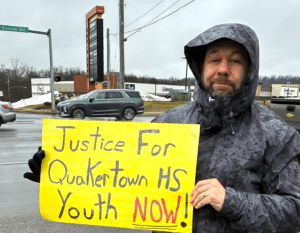In an effort to bolster incentives for local law enforcement officers and sheriffs’ offices nationwide, the Department of Homeland Security’s recent announcement outlines how it will reimburse the cost of local law enforcement salaries and benefits, including up to “25% of overtime coverage” for annual salaries of eligible “deputized” ICE 287(g) officers.
“ICE is not only supercharging our hiring, we are also multiplying partnerships with state and local law enforcement to remove the worst of the worst including murderers, gang members, rapists, terrorists and pedophiles from our country,” the DHS press release said. However, as both the Associated Press and Transactional Records Acess Clearinghouse (TRAC) have reported, over 70 percent of ICE detainees have no criminal records.
Local immigrant and civic advocates said ICE incentive payments, thanks to Trump’s One Big Beautiful Bill, could run afoul against 287(g) programs – rather than enhance them – because of the way the partnership language is written.
Keith Armstrong is an American Civil Liberties Union of Pennsylvania fellowship attorney for immigrants’ rights. He said while the ICE reimbursement scheme is separate from the ACLU PA’s current case against Bucks County Sheriff Fred Harran, who in May entered an “illegal” 287(g) partnership, Armstrong is confident the ICE reimbursement scheme will soon face legal challenges.
“There are two reasons I would say they (reimbursements) are patently illegal,” Armstrong said.
First, while ICE provides free training, local law enforcement agencies particpating in the 287(g) program “must do so at their own expense,” Armstrong explained; and secondly, “the program language has not changed even in light of the ‘Big Beautiful Bill’ passage.”
“Funding reimbursements would be coming from ICE and that is directly in conflict with the 287(g) statute,” Armstrong said.
The DHS press release stated that starting October 1, 2025:
- ICE will fully reimburse participating agencies for the annual salary and benefits of each eligible trained 287(g) officer, including overtime coverage up to 25% of the officer’s annual salary.
- Law enforcement agencies will be eligible for quarterly monetary performance awards based on the successful location of illegal aliens provided by ICE and overall assistance to further ICE’s mission to Defend the Homeland:
- 90% – 100% – $1,000 per eligible task force officer
- 80% – 89% – $750 per eligible task force officer
- 70% – 79% – $500 per eligible task force officer
Armstrong expects a national advocacy group to bring a legal challenge over the reimbursements – and Armstrong predicted such a challenge would win.
He noted at “the very best” ICE payments to local law enforcement “blurs the line between the 287(g) agreement and an employer/employee relationship.”
“If ICE is paying any portion of a law enforcement officer’s salary, is there an expectation that the officer provides an equal amount of services to ICE?” Armstrong posited.
Email requests to DHS for clarification about expectations for salary reimbursements – like whether trained deputies must dedicate all of their time for immigration enfroecment – were unsuccessful.
“It raises a lot of questions about who is in control of the deputies and how much time they dedicate, and that really takes resources away from the local duties tax payers are paying them for,” Armstrong added.
Heidi Roux, director of immigrant justice at The Welcome Project PA said in an email that she is worried about the economic concept of “opportunity cost, not only the financial cost” of a DHS reimbursement arrangement.
“If local law enforcement takes on this federal role, they are not able to simultaneously do their job of local community policing because they will be doing the job of ICE, not the job they are being paid to do. Ultimately, our community as a whole will pay the cost as victims will not report crimes because of 287(g) agreements and actual criminals will roam free in our neighborhoods,” Roux said.
Democratic Candidate for Bucks County Sheriff Danny Ceisler declined to provide in-depth commentary, noting he is still evaluating the details of the new program. However, he added “there is no such thing as a free lunch, and we know the vast majority of people being swept up are law abiding and contributing members of our communities.”
Armstrong said DHS does not say if they would assume liability for wrongful actions taken by local officials, further putting counties and local law enforcement at risk for costly legal fees when mistakes are made and people are wrongfully incarcerated or detained.
“They [DHS] are minimizing the impact (cost) but there is an absent cost which is the potential liability for counties of law enforcement who enforce immigration laws,” Armstrong said.
He said ICE activity has been linked to civil rights violations, racial profiling “and pretty severe issues. Bucks County would still be liable for any violations that would happen. That’s the missing piece here that could incur a lot of cost as mistakes happen fairly regularly.”
In fact, in Arizona’s Maricopa County where an overzealous (critics say racist) Sheriff Joe Arpaio was found guilty of engaging in racial profiling and civil rights violations during his 287(g) partnership, leaving taxpayers on the hook for hundreds of millions of dollars.
READ: Teachers Sue Over Trump’s Immigration Crackdown, Saying Students Are Staying Home
Filed in 2010 [Galarza v Szalczyk, et. al], ACLU PA won a lawsuit in 2014 on behalf of Ernesto Galarza against Lehigh County. Galarza had been arrested in Allentown and mistaken for an undocumented immigrant from the Dominican Republic. Galarza is a U.S. citizen from New Jersey. The county settled the lawsuit and paid Galarza roughly $95,000 for the mistake, the ACLU PA website said. Galarza was held for three days in Lehigh County Prison, at ICE’s request.
The case has become a national cautionary signpost as more counties – including Lehigh –require judicial bench warrants to hold ICE suspected undocumented immigrants in local jails.
During several recent Bucks County Commissioners meetings, citizens have repeatedly claimed crime will escalate and fragile bridges built between local officers and immigrant communities will fracture if the county’s ICE 287(g) agreement stands. Other concerns include less frequent crime reports by immigrants – which could embolden criminal activity.
“Regardless of where the money comes from, this makes our communities more dangerous because it deteriorates the trust of police and crimes will go unreported,” said Rachel Rutter, an attorney, executive director and founder of Project Libertad.






